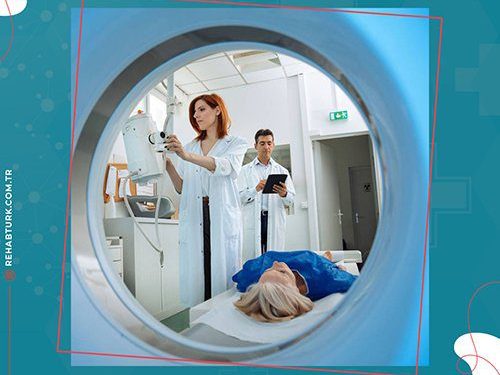Radiotherapy in Türkiye
What is radiotherapy?
Radiation therapy is a cancer treatment that uses focused beams of radiation to kill cancer cells.
The most common type of radiation therapy is external radiation.
This type involves a machine that directs high-energy beams of radiation at cancer cells.
The device allows targeting radiation at specific locations.
This is why doctors use external radiation for almost all types of cancer.
Why is radiotherapy done?

Radiotherapy is an important tool in the treatment of cancer and is often used in combination with other treatments.
such as chemotherapy or surgery to remove a tumor.
The main goals of radiation therapy are to shrink tumors and kill cancer cells.
While treatment is also likely to lead to infection of healthy cells.
Normal, non-cancerous cells have the ability to recover from radiation therapy.
To reduce the effect of radiation on the body, radiation targets only specific points on the affected person’s body.
Radiotherapy can be used during different stages of cancer treatment and for different results.
Radiation therapy is used to:
- Reducing symptoms in advanced and late stages of cancer.
- For the initial treatment of cancer.
- For treatment in conjunction with other cancer treatments.
- To shrink the tumor before surgery .
- To kill any remaining cancer cells after surgery.
Risks of radiation therapy
Regardless of the type of radiation used, fatigue and hair loss are common side effects.
Hair loss occurs only in the part of the body that is being treated.
Radiation also affects skin cells.
Skin changes include:
- Warts (infections of the pores of the skin)
- Drought
- itching
- exfoliate
Other side effects of radiation depend on the area treated.
They may include:
- diarrhea
- earache
- mouth sores
- dry mouth
- nausea
- impotence
- sore throat
- swelling
- Difficulty swallowing
- Urination difficulties, such as painful urination or urinary urgency
- vomiting
According to medical sources, the majority of these side effects disappear within two months after treatment is completed.
In rare cases, side effects may persist or appear for six months or longer after treatment ends.
Late side effects may include:
- Oral problems
- joint pain
- Lymphedema (lymphedema refers to swelling that generally occurs in an arm or leg), or swollen tissues
- infertility
- Possible secondary cancer
These can sometimes appear after years of treatment.
Radiotherapy steps:
The first step in radiotherapy is to determine the appropriate form of treatment for the patient’s condition. The doctor will also determine the dose amounts and frequency of radiation most appropriate for the type and stage of your cancer.
Sometimes a doctor may decide that radiation therapy is more appropriate to use at a later stage, so the person may receive other cancer treatments first.
How is radiotherapy performed?
Radiation therapy usually involves treatment sessions five days a week for 1 to 10 weeks. The total number of treatments depends on the size and type of cancer.
Each session usually takes about 10 to 30 minutes. Often, the individual is given a weekend off each week from treatment, which helps restore normal cells.
For each session, the patient lies on a treatment table, and a team applies the same types of pillows and restraints used during the initial radiation simulation.
Protective blankets or shields may also be placed on or around the victim to protect other parts of the body from unnecessary radiation.
Radiation therapy involves using a “linear accelerator” machine that directs radiation to the right place. The machine may move around the table to direct the radiation at the appropriate angles. The machine may also hum, which is completely normal.
The patient should not feel any pain during this test. He will also be able to communicate with the care team via the room intercom, if needed. Doctors will be nearby in an adjacent room, monitoring the test.
Follow-up after radiotherapy
During the treatment weeks, the patient’s healthcare provider will monitor the treatment schedule, dosing, and information about the patient’s general health.
He will undergo several imaging scans and tests during radiation so that doctors can monitor the response to treatment.
These exams and tests will also tell doctors if any changes need to be made to treatment.
And in the event that the patient suffers from any side effects from radiation, even if they are expected – it is better to inform the health care provider at the next treatment date.
Sometimes, even small changes can make a big difference in reducing side effects.
At the very least, you may be given advice or medication from doctors to help ease the discomfort of side effects.
How can I book for radiotherapy treatment in Türkiye?

- Free medical support on the phone: You will have a dedicated representative for your health condition who is always ready to answer your questions.
- Free consultation with a specialist doctor: Your medical representative will consult with a number of doctors and hospitals to find the best possible treatments.
- Free travel visa arrangement: We will contact the embassy in your country to assist you in obtaining a visa to visit Türkiye.
- Free itinerary planning: We will create a schedule for your medical trip to Türkiye.
- Free translation of documents and reports: We will translate medical documents and reports into Turkish on your behalf.
- Free support and monitoring: We will monitor the stages of treatment and be by your side every step of the way.
- Free instant translation: We will be with you during the treatment stages to provide translation between you and the medical team.
- Free accommodation and transportation coordination: We will book accommodation for you and your companions in Türkiye, along with transportation services.
Contact REHABTÜRK doctors for more information about the procedure and to evaluate your medical condition.

